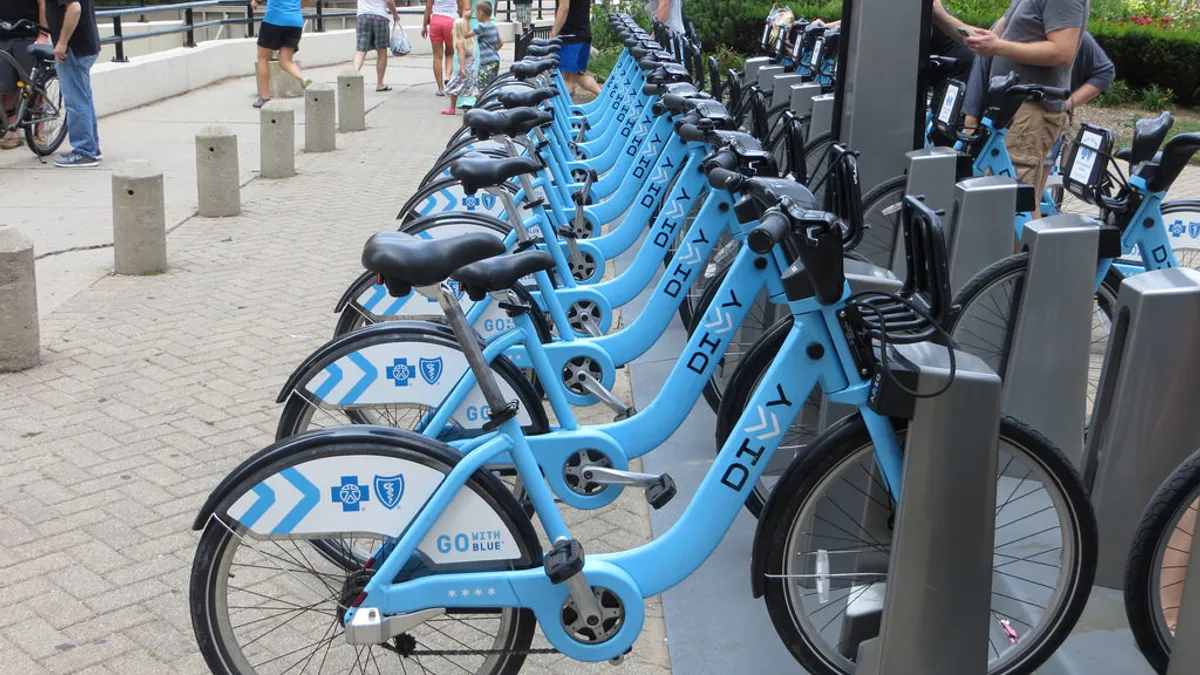Dive Brief:
- Chicago Mayor Rahm Emanuel and the city's Department of Transportation have proposed an amendment to an existing contract with bike-share operator Motivate — now owned by Lyft — for a major modernization and expansion of the city's bike-share system, Divvy. The city council still has to approve the contract amendment. Divvy also announced the proposed upgrades on Twitter.
BIG NEWS about Divvy expansion!! @chicagosmayor has announced a proposal to more than double our fleet of bikes and reach all 50 wards in just three years thanks to a $50 million investment by @lyft: https://t.co/JGfbA9www1 pic.twitter.com/yZn5X6CMzi
— Divvy (@DivvyBikes) March 13, 2019 - Under the proposed contract amendment, Lyft would make a $50 million investment to expand bike-share to all of the city's wards by 2021. It would more than double the existing bike fleet by adding 10,500 new bikes and 175 stations, bringing the overall total to 16,500 bikes and 800 stations. All of the new bikes would be electric pedal assist and lock to traditional Divvy docking stations or to regular bike racks. Lyft would also overtake sponsorship of the Divvy system from health care company Blue Cross Blue Shield of Illinois.
- The contract update restructures the financial terms of sponsorship. The city estimates it will receive at least $77 million in guaranteed revenue from Lyft over the course of the nine years left in the bike-share contract.
Dive Insight:
Chicago's commitment is significant on a number of points. It would increase mobility equity by ensuring bike-share is available in all parts of the city. Equitable distribution of resources has been a hot topic in the city for years. Some believe it came to a head last year when Emanuel announced he wouldn't run for reelection; he faces criticism for not distributing enough services and economic development initiatives in traditionally underserved neighborhoods.
Under the amended agreement, Lyft would also expand the discounted bike-share program for low-income individuals. In addition to offering greater mobility equity for underserved neighborhoods, Lyft would pilot an adaptive bike-share program for people with disabilities. The expanded program is designed to provide an extra 200 jobs with Divvy. Lyft would also offer a job training program for youth and ex-offenders.
In addition, all of the more than 10,000 new bikes would be e-bikes. Traditional bike-share programs generally don't have large fleets of e-bikes yet. New York's Citi Bike released its first 200 e-bikes into its fleet last August and plans to add an additional 4,000 e-bikes this year. One issue did crop up with New York's e-bike announcement: dismay over an extra $2 per trip fee for using e-bikes instead of traditional pedal models. Chicago's proposed contract amendment does not discuss any additional fees except to say, "[t]he city will maintain control over significant fare pricing changes and any new fare products or promotions."
Other than Chicago's six-month dockless bike-share pilot last year, this is the city's first real foray into the dockless space. The e-bikes will be equipped with locking devices so the bikes can be left places other than traditional Divvy docking stations, a feature that was also required during last year's dockless pilot and prompted dockless operator ofo to drop out of the program. The concept of locking mechanisms on dockless devices is catching on in other cities such as Washington, DC, and some mobility companies — including Jump and Skip — have voluntarily included locks on their dockless devices.
Lyft has exclusive rights to operate a bike-share program in Chicago. The city did not specifically differentiate between traditional and dockless bike-share programs when noting Lyft's exclusivity, but the introduction of the "hybrid locking" e-bikes suggests that other dockless bike-share companies might be precluded from operating in Chicago. San Diego encountered a similar situation in which city leaders investigated whether granting permits to dockless program operators violated its exclusivity agreement for its traditional bike-share program, DecoBike.












